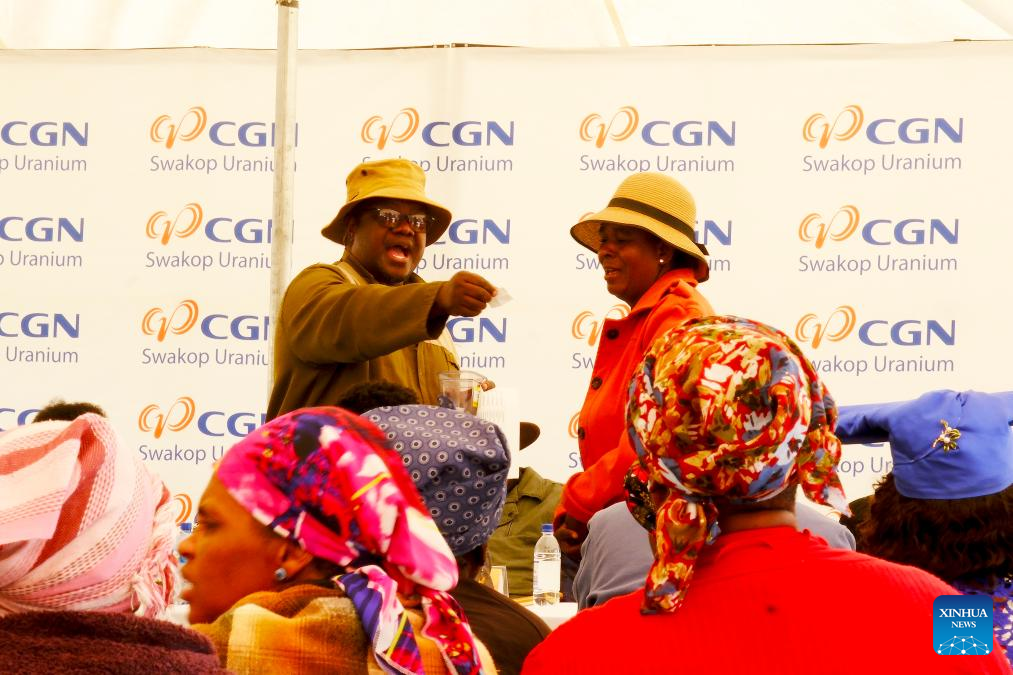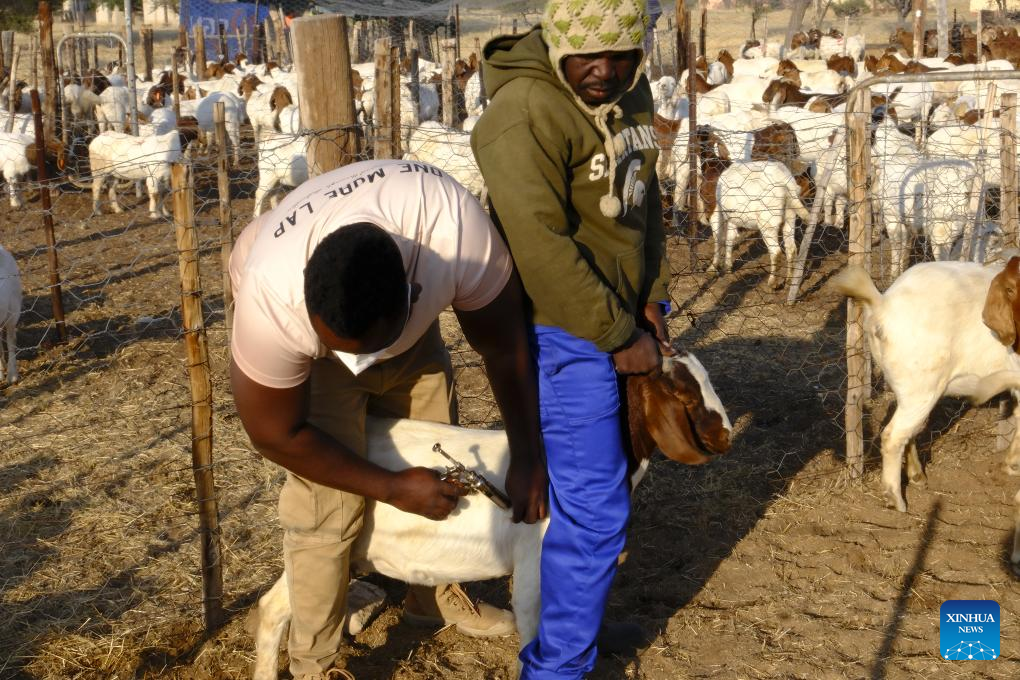
Farmers receive livestock distributed randomly through lottery by the Hope Farm Project in Usakos, Namibia, on July 26, 2025. (Xinhua/Lin Jing)
by Xinhua writers Lin Jing, Musa C Kaseke
USAKOS, Namibia, July 28 (Xinhua) -- Lena Gauses was all smiles when she received a starter flock of goats and sheep at Hope Farm in Usakos, about 210 km west of the Namibian capital, Windhoek.
The Hope Farm Project, funded jointly by the Swakop Uranium Foundation and Namibia's Ministry of Agriculture, Water, Fisheries, and Land Reform, is providing a vital lifeline to rural communities, fostering sustainable livelihoods, and creating a new generation of empowered farmers.
The Swakop Uranium Foundation is sponsored by Swakop Uranium, a Namibian-Chinese joint venture.
Gauses, 45, grew up on Farm Daweb in Usakos, about 140 km northeast of Swakopmund, capital city of the Erongo Region. For her, farming is more than just an occupation; it is a return to her roots.
"I was born and bred here at this farm. My grandfather used to work here as a laborer," she told Xinhua. "And now, after years, the farm has been classified as a resettlement farm."
"I've also been part of this resettlement group. In May, we were resettled here, and I'm now farming on the other side of the farm, named Erongo POS," Gauses said. "The reason why I'm interested in farming is that previously the elders used to farm here."
With an investment of 3 million Namibian dollars (about 170,000 U.S. dollars), the Hope Farm Project was officially launched on Saturday, July 26. By the end of 2025, 1,000 goats and sheep are expected to be distributed.
At the launch event, 630 animals were handed over to the first cohort of 30 local farmers, each with a herd of 20 ewes and one ram, with the remaining livestock to follow later this year.
In addition to donating 1,000 goats and sheep annually, the project provides systematic support to participating farmers, including training and experience-sharing, vaccination services, veterinary care, and access to marketing channels.
The goal is to help low-income households raise their earnings and lift themselves out of poverty.
A key to the project's sustainability is its innovative revolving model: after 15 months, participating farmers are expected to return 10 young animals, ensuring that the benefits can be extended to an even wider group in future rounds.
For Gauses, this opportunity is deeply personal.
She fondly recalled her grandparents and parents living and working on the very same farm, saying her passion for farming is a deliberate effort to reconnect with her heritage and inspire the next generation.
"I want to go back to our roots to start farming again. Nowadays, the youth are not interested in farming, so I want to encourage them just to be part of it," Gauses said.
The donation she got from the Swakop Uranium Foundation is going to change a lot of things in her life.
"I will create jobs for some people who don't have jobs. Then the farming will expand. That's my big dream, that my farming will expand," she said.
The Hope Farm Project builds upon existing governmental initiatives. Since 2009, Namibia's Ministry of Agriculture, Water, Fisheries, and Land Reform has been implementing the Small Stock Distribution and Development in Communal Areas program.
This nationwide revolving initiative aims to empower vulnerable households across all 14 regions by enhancing food and nutrition security and providing a sustainable source of income through the provision of high-quality, locally adapted breeding flocks of goats and sheep.
To date, the program has supported 779 farmers with 15,580 ewes and 779 rams.
"We were facing many challenges due to last year's drought, which depleted our livestock," Ronald Kahoro, 32, another Hope Farm Project participant in the region, told Xinhua.
He said that while some areas now have pastures due to recent rains, many farmers lack livestock. "So we are happy to receive this boost, and we'll work hard... to assist other people as well."
Inge Zaamwani, Namibia's minister of agriculture, in her keynote address, praised the Hope Farm Project launch as a crucial step in helping realize national development goals.
"I must commend the project launched by the Swakop Uranium Foundation, because it follows strong principles. Livestock is given to selected farmers not as a handout, but as a tool for building income and creating independence," she said.
Zaamwani particularly highlighted the project's focus on women and youth, calling for continued investment in them, not only through resources but also through knowledge, skills, and opportunities.
Meanwhile, representing the Chinese Embassy, Counselor Wei Jinming noted how the initiative mirrors China's efforts in strengthening its agricultural sector through community-led solutions.
In the concluding remarks of the launch, Percy McCallum, chairperson of the Swakop Uranium Foundation, thanked the partners and communities involved.
"Ultimately, hope will be brought by supporting thousands of emerging farmers and helping build a more inclusive, resilient agricultural economy," he said.
Agriculture remains a key part of Namibia's economy, contributing around 5 percent to the national gross domestic product. About 70 percent of Namibians depend on agricultural activities for their livelihoods. ■

Workers vaccinate goats before they are handed over to beneficiary farmers under the Hope Farm Project in Usakos, Namibia, on July 26, 2025. (Xinhua/Lin Jing)
